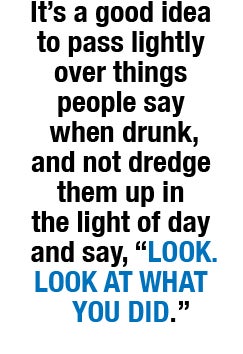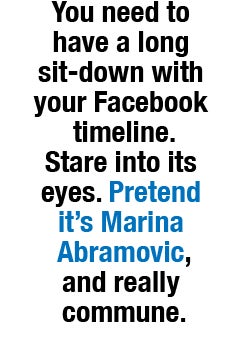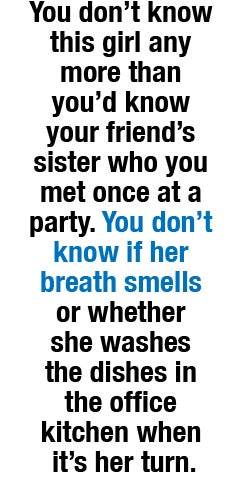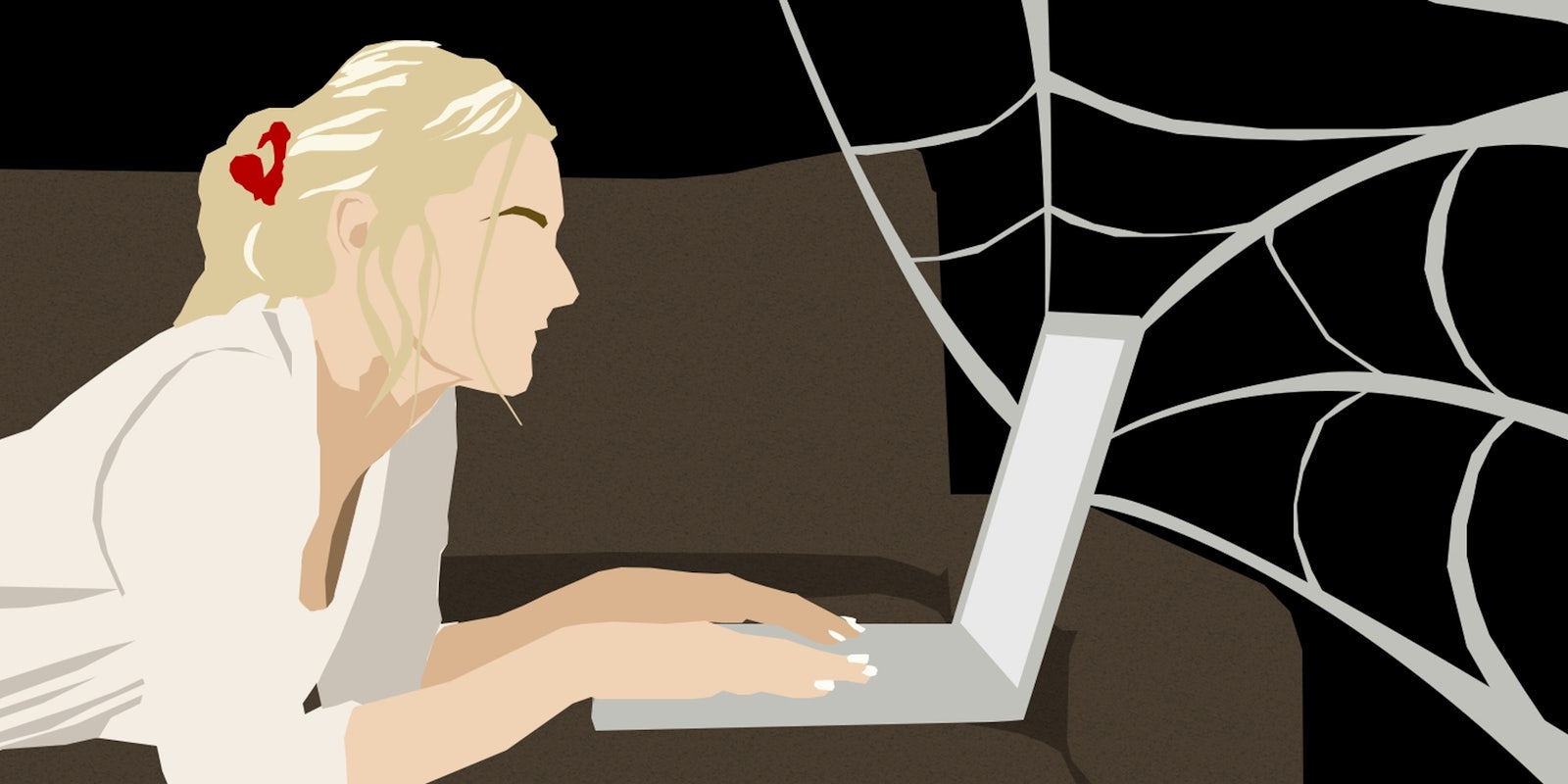By JESS ZIMMERMAN
Thanks to the Internet, we now have a host of new ways to offend, enrage, misinterpret, creep out, or alienate people. In the Tangled Web, we field your questions about how to be a decent human online.
Frozen eggs on Twitter
I’m a writer, and one of the things I’ve written about is women freezing their eggs so they can have children at later ages. The other night, a woman I know professionally but not at all well tweeted at me “so, how much does egg-freezing cost and where do you do it? Not asking for a friend.” I got an email notification but didn’t respond right away, and when I went to write back the next morning I saw she’d deleted the tweet. Should I pretend I never saw it? I do know the answers to her questions, as she knew I would.
Not everyone gets email notifications from Twitter, but enough people do that she probably knows you know she knows you know. If you say nothing, you’re not just gracefully letting it fall—you’re sending the clear message “I am going to pretend I never saw this.”
 There’s an argument to be made for doing that, of course. The fact that she deleted the tweet means she’s embarrassed about something; maybe she’s just blushing over the fact that she sent it as a publicly viewable reply instead of a direct message, or maybe she feels like asking the question in the first place (or needing to ask it) was pathetic. How late at night was this tweet, anyway? She might have been drunk, and it’s a good idea to pass lightly over things people say when drunk, and not dredge them up in the light of day and say, “LOOK. LOOK AT WHAT YOU DID.”
There’s an argument to be made for doing that, of course. The fact that she deleted the tweet means she’s embarrassed about something; maybe she’s just blushing over the fact that she sent it as a publicly viewable reply instead of a direct message, or maybe she feels like asking the question in the first place (or needing to ask it) was pathetic. How late at night was this tweet, anyway? She might have been drunk, and it’s a good idea to pass lightly over things people say when drunk, and not dredge them up in the light of day and say, “LOOK. LOOK AT WHAT YOU DID.”
Actually, though, this isn’t something she needs to be ashamed of. She didn’t confess an affair in a late-night tweet; she asked you about a medical procedure on which you have a certain amount of expertise. In the light of day, she clearly doesn’t want to discuss this on Twitter. But if you have information for her, it should be fine to send her an email saying “I saw your tweet, and here’s your answer.” That way you’re not making this a bigger deal by studiously ignoring it. (Wondering about your reproductive options is not a big deal!) At the same time you’re also imbuing it with a level of formality that is appropriate in a professional relationship—and the lack of which, let’s be honest, is what made the original tweet weird indeed.
If you don’t have her email address, you don’t know her well enough to pursue her in hopes of talking about her ovaries. Wait for her to ask again or let it drop.
…
Facebook whine-ohs
I’ve been having a hard year—I’ve moved to a place where I don’t have many friends, I’m working two jobs that require a lot of frustrating customer service, and I’m having no luck on the dating scene. It’s a lot, and to blow off some tension I vent about it—often—on Facebook. But when things like the Sandy Hook shootings or the Boston marathon explosions happen, I feel like there’s an unspoken agreement that talking about your own problems becomes taboo. Is there a way for me to retain my Facebook safety net when tragedies happen without seeming flippant or offensive? If I’m suppose to just shut up, how long after a serious incident are you allowed to start complaining again? And how serious does a tragedy have to be to affect your sharing habits?
You need to have a long sit-down with your Facebook timeline. Stare into its eyes. Pretend it’s Marina Abramovic, and really commune. Do you post interesting links? Cute pictures of your pets? Funny stories your friends will like? Literally anything that’s not about your misery and your struggle?
I ask because I haven’t seen your timeline, but from your letter it sounds like you may be addicted to Facebook whines. A whine-o. (I’ll be here all week.) You’re stressed out right now, and it’s fine to express that, but when you start worrying about how soon you can get back to complaining after a tragedy, it’s time to make sure you don’t have a problem.

But let’s assume you don’t. Life doesn’t stop just because terrible things are happening, and while it’s only polite to put ongoing woes on hold—you can wait 24 hours to tell your friends that you still hate being single—sometimes sorrows come in battalions. What if, say, your father is diagnosed with cancer the same day that the rest of the world is glued to news of a new mass shooting?
First of all, don’t feel the need to name-check the horror of the day. Saying “I feel really bad about the Boston marathon but…” doesn’t make you look more compassionate—it only invites comparisons. Just forge ahead. And second, don’t be offended if you don’t get as much supportive response as you would like. A lot of people don’t have the bandwidth for the social part of social media when they’re glued to the news—they may not even see your post. If you want to make sure everyone’s in the loop, it might be wise to wait until national events are less all-consuming. But don’t feel selfish for wanting to talk about personal crises. You’re allowed to have your own problems while acute, close-to-home horrors are going on.
…
Recommending a “friend” for a job
A girl I only know through Twitter is looking for a job, and seeming really depressed and defeated about her unemployment. I want to help her, but I don’t really know her—I know she’s funny and seems smart, but we’ve never met in real life and I can’t vouch for her work ethic or even her personality offline. Can I recommend her for jobs at my company or friends’ companies? Do I tell them I only know her from online, or do I say she’s “a friend”?
 Because social media involves technology, we tend to exaggerate how different it is from what we used to do. But really, you don’t know this girl any more than you’d know your friend’s sister who you met once at a party. Sure, you lack some hands-on knowledge, like whether her breath smells or whether she washes the dishes in the office kitchen when it’s her turn. On the other hand, you’ve seen her agonize over her unemployment, which means that in a sense you know her better than your offhand IRL acquaintances. And if your friend said, “Hey, my sister who you met is looking for a job,” I’m guessing you wouldn’t hesitate to say, “There’s an opening at my company, I’ll make sure they see her resume.”
Because social media involves technology, we tend to exaggerate how different it is from what we used to do. But really, you don’t know this girl any more than you’d know your friend’s sister who you met once at a party. Sure, you lack some hands-on knowledge, like whether her breath smells or whether she washes the dishes in the office kitchen when it’s her turn. On the other hand, you’ve seen her agonize over her unemployment, which means that in a sense you know her better than your offhand IRL acquaintances. And if your friend said, “Hey, my sister who you met is looking for a job,” I’m guessing you wouldn’t hesitate to say, “There’s an opening at my company, I’ll make sure they see her resume.”
On the other hand, maybe you would hesitate, in which case you should keep your mouth shut. The basic rule of thumb is, don’t do anything that you wouldn’t do for another casual acquaintance. If you’d like to pretend that the employment world doesn’t run at least partly on benign nepotism, you’re awfully naive, but you might as well be consistent. But it’s perfectly kosher for you to help this girl just as much as you’d help someone else you only kind of know, with some reason to think well of.
In the end, I’d say let this girl know if you have inside information about job opportunities she’s qualified for that haven’t yet been advertised. If there’s a job at your company, tell whoever is reading the resumes that you’ve talked to her, she seems smart, and they shouldn’t immediately throw out her application. After that, it’s up to her to impress them.
Jess Zimmerman has been making social blunders on the Internet since 1994. Most of her current interpersonal drama takes place on Twitter (@j_zimms).


